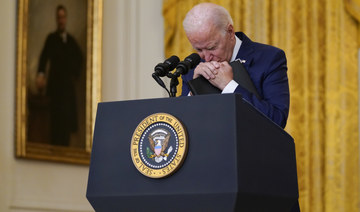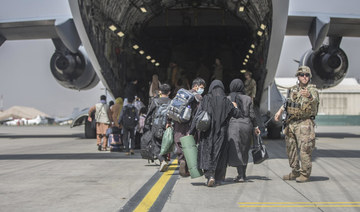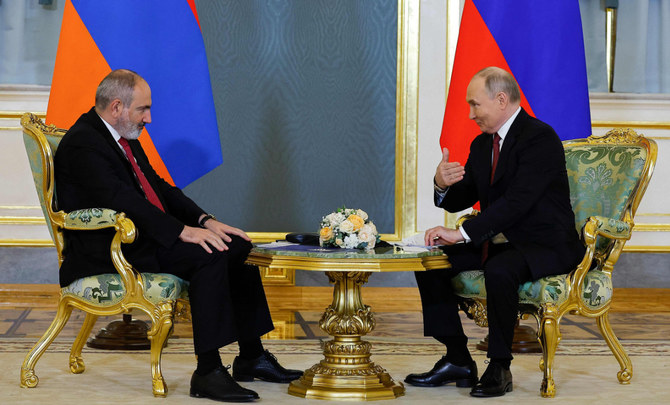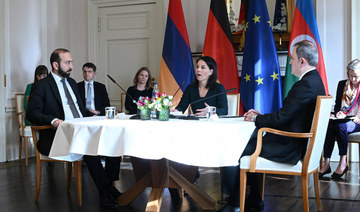WASHINGTON: Acting swiftly on President Joe Biden’s promise to retaliate for the deadly suicide bombing at Kabul airport, the US military said it killed two members of the Daesh group’s Afghanistan affiliate with a drone strike in the group’s eastern stronghold.
The attack Saturday local time came amid what the White House called indications that Daesh planned to strike again as the US-led evacuation from Kabul airport moved into its final days. Biden has set Tuesday as his deadline for completing the exit.
Biden authorized the drone strike and it was ordered by Defense Secretary Lloyd Austin, a defense official said, speaking on condition of anonymity to provide details not yet publicly announced. It was not immediately clear whether the targeted Daesh members were directly involved in Thursday’s airport attack. The US military initially said one person was killed.
“It was a single mission to get these targets and as the assessments and information flowed over time, we were able to recognize that another was killed as well and one wounded,” Pentagon spokesman John Kirby said at a Defense Department briefing Saturday.
“They were Daesh-K planners and facilitators and that’s enough reason there alone. I won’t speak to the details of these individuals and what their specific roles might be,” Kirby said. He added: “We have the ability and the means to carry over the horizon counterterrorism capabilities and we’re going to defend ourselves.’’
He declined to identify those killed but said the United States knew who they were.
The airstrike was launched from beyond Afghanistan less than 48 hours after the devastating Kabul attack that killed 13 Americans and 169 Afghans with just days left in a final US withdrawal after 20 years of war. US Central Command said it believed its strike killed no civilians.
Biden also warned that US military commanders believe that another terror attack like the deadly suicide bombing at Kabul airport is “highly likely in the next 24-36 hours.”
After a briefing from his national security team, Biden said in a statement that the drone strike was “not the last.”
“The situation on the ground continues to be extremely dangerous, and the threat of terrorist attacks on the airport remains high. Our commanders informed me that an attack is highly likely in the next 24-36 hours,” Biden said.
The speed with which the US military retaliated reflected its close monitoring of Daesh and years of experience in targeting extremists in remote parts of the world. But it also shows the limits of US power to eliminate extremist threats, which some believe will have more freedom of movement in Afghanistan now that the Taliban is in power.
The airstrike came after Biden declared Thursday that perpetrators of the attack would not be able to hide. “We will hunt you down and make you pay,” he said. Pentagon leaders told reporters Friday that they were prepared for whatever retaliatory action the president ordered.
Few new details about the airport attack emerged on Friday, but the Pentagon corrected its initial report that there had been suicide bombings at two locations. It said there was just one — at or near the Abbey Gate — followed by gunfire. The initial report of a second bombing at the nearby Baron Hotel proved to be false, said Maj. Gen. Hank Taylor of the Pentagon’s Joint Staff; he attributed the mistake to initial confusion.
Based on a preliminary assessment, US officials believe the suicide vest used in the attack, which killed at least 169 Afghans in addition to the 13 Americans, carried about 25 pounds of explosives and was loaded with shrapnel, a US official said Friday. A suicide bomb typically carries five to 10 pounds of explosives, said the official, who spoke on condition of anonymity to discuss preliminary assessments of the bombing.
Biden still faces the problem over the longer term of containing an array of potential extremist threats based in Afghanistan, which will be harder with fewer US intelligence assets and no military presence in the nation.
In an Oval Office appearance Friday, Biden again expressed his condolences to victims of the attack. The return home of US military members’ remains in coming days will provide painful and poignant reminders not just of the devastation at the Kabul airport but also of the costly way the war is ending. More than 2,400 US service members died in the war and tens of thousands were injured over the past two decades.
The Marine Corps said 11 of the 13 Americans killed were Marines. One was a Navy sailor and one an Army soldier. Their names have not been released pending notification of their families, but the Pentagon said Saturday they would be released soon.
Still, sorrowful details of those killed were starting to emerge. One Marine from Wyoming was on his first tour in Afghanistan and his wife is expecting a baby in three weeks; another was a 20-year-old man from Missouri whose father was devastated by the loss. A third, a 20-year-old from Texas, had joined the armed services out of high school.
Biden ordered US flags to half-staff across the country in honor of the 13.
They were the first US service members killed in Afghanistan since February 2020, the month the Trump administration struck an agreement with the Taliban that called for the militant group to halt attacks on Americans in exchange for a US agreement to remove all American troops and contractors by May 2021. Biden announced in April that he would have all forces out by September.
Psaki said the next few days of the mission to evacuate Americans and others, including vulnerable Afghans fleeing Taliban rule, “will be the most dangerous period to date.”
The Pentagon said Saturday morning that about 6,800 people were airlifted from Kabul on US and coalition aircraft in the past 24 hours, and about 117,000 people have been airlifted over the last two weeks.
























